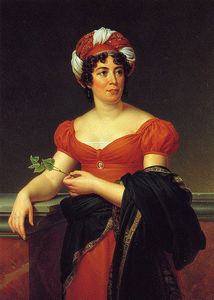Liberty Matters
The Cosmopolitanism of the Coppet Group

In her previous comment, Catriona Seth mentioned a key trait of Madame de Staël's Weltanschauung that deserves further consideration: her cosmopolitanism. This was indeed the defining character of the so-called Coppet group to which she and her friends belonged.[111] This was a genuine island of freedom and civility, whose refinement evoked that douceur de vivre which we tend to associate with the Old Regime. It was a small universe in which philosophers and writers were welcome and played a key role.
But who were the other members of Coppet beside Madame de Staël and her father, Jacques Necker? The list of those who came to this place is a who's who of European intelligentsia at that time: Benjamin Constant, Prosper de Barante, the Schlegel brothers, Mathieu de Montmorency, Sismonde de Sismondi, Friedrich Tieck, and Charles-Victor de Bonstteten, as well as a host of distinguished Russian visitors. The Coppet group was already active in 1798, even though its golden days were from 1804 (when Necker died) to roughly 1810. Literature was eventually replaced by politics, which eventually became the most prominent subject of conversation at Coppet. After Madame de Staël's death on July 14, 1817, Coppet became a true lieu de mémoire, a place of memory, where distinguished visitors subsequently came to pay homage to the genius of the hostess and her mother and father.
The famous French literary critic Sainte-Beuve went so far as to call the Coppet group "the Elysée intellectual of an entire generation," the Romantic generation. More importantly, the Coppet group constituted an island of freedom and moderation in the middle of an oppressed and unfree Europe. Its geographical position was significant. Located in Switzerland— "un singulier pays, on y parle français, on y pense à l'anglaise" ("a singular country, where people speak French and think like the English"), as Schlegel once said— Coppet evolved into a vibrant center of opposition to Napoleon. Nonetheless, the circle around Madame de Staël was much more than a mere opposition group. Situated at the intersection of three cultures, Coppet was above all a cosmopolitan place where a spirit of openness and inquisitiveness dominated. At Coppet, the doors were open all the time and the guests were literally subjected to relentless and intense socialization. In-depth discussions of literary works (from Calderon, Goethe, and Sophocles to Sappho, Racine, and Shakespeare) were punctuated by moments of (savvy) political gossip. The theater had a special place at Coppet; every month two new plays were staged there. The guests of Madame de Staël were also allowed to enjoy private reading and writing time, and often they went out on long walks around the chateau. The beauty of nature (most notably the glacier at Chamonix) and the cultural riches of Geneva were additional attractions.
Not surprisingly, those who returned from Coppet were overwhelmed by the cultural riches lavished upon them there. After spending a few days in the company of Madame de Staël and her friends in 1804, Bonstetten confessed to a friend upon returning home that he was exhausted from too much socialization and intellectual exchange. The unique creativity of the place was confirmed by another guest (Voght). Everyone present at Coppet was doing something, he wrote. There was always something exciting going on. Everyone there was doing something, he wrote. As someone was writing an essay on Germany, others were talking about a play or an opera, while a few others were discussing philosophy and politics. Madame de Staël's works reflect and bear the cosmopolitan imprint of the Coppet group.
Endnotes
[111.] Editor's Note: There is in Paris an Institut Coppet which states as its mission: "la mission est de participer, par un travail pédagogique, éducatif, culturel et intellectuel, à la renaissance et à la réhabilitation de l'école française d'économie politique, et à la promotion des différentes écoles de pensée favorables aux valeurs de liberté, de propriété, de responsabilité et de libre marché." Website: <https://www.institutcoppet.org>.
Copyright and Fair Use Statement
“Liberty Matters” is the copyright of Liberty Fund, Inc. This material is put on line to further the educational goals of Liberty Fund, Inc. These essays and responses may be quoted and otherwise used under “fair use” provisions for educational and academic purposes. To reprint these essays in course booklets requires the prior permission of Liberty Fund, Inc. Please contact oll@libertyfund.org if you have any questions.